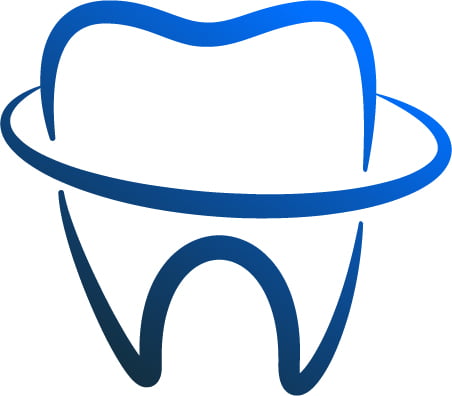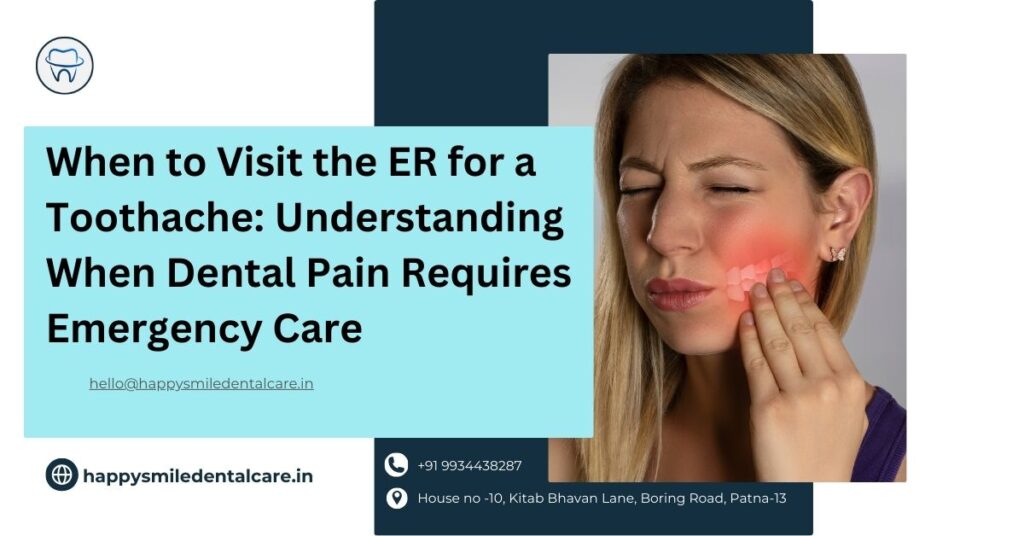Toothaches can be incredibly uncomfortable, but not every case requires a trip to the emergency room. However, some types of dental pain can indicate serious underlying issues that require immediate attention. Knowing when to seek emergency care is vital to protect your health and prevent complications.
At Happy Smile Dental Care, we understand how distressing dental pain can be. We’re here to guide you on when to visit the ER, when to schedule a dental appointment, and how to take preventive steps to protect your oral health.
In this article, we’ll explore common causes of toothaches, signs of dental emergencies, and how to handle urgent situations effectively. You’ll also learn how to lower your risk of future dental issues through good oral hygiene and regular dental checkups.
Common Causes of Toothaches
Toothaches can arise from various conditions, ranging from minor issues to severe problems requiring immediate attention. Here are some of the most common causes:
Cavities and Tooth Decay
Cavities occur when bacteria in your mouth erode tooth enamel, leading to small holes. If left untreated, decay can reach deeper layers of the tooth, causing pain and sensitivity, especially when eating or drinking hot, cold, or sweet foods.
Gum Disease
Conditions like gingivitis (early-stage gum disease) and periodontitis (advanced gum disease) can cause swollen gums, bleeding, and pain. Over time, gum disease can lead to tooth loss and other complications if untreated.
Dental Abscess
A dental abscess forms when pus accumulates due to infection in the tooth or surrounding tissues. Symptoms include severe, throbbing pain, swollen gums, fever, and even a foul taste in your mouth. An abscess is a serious condition requiring immediate dental care.
Injury or Trauma
Accidents, such as falls or sports injuries, can cause chipped, cracked, or dislodged teeth. Trauma may also lead to sensitivity or pain in the affected area.
Understanding the root cause of your toothache is essential for addressing the problem effectively.
Signs That Indicate a Dental Emergency
While some toothaches can wait for a scheduled dental appointment, others may require urgent attention. The following symptoms can point to a dental emergency that shouldn’t be ignored.
Severe Pain
Any tooth pain that is extreme, persistent, or interferes with daily activities warrants immediate evaluation. Intense discomfort might signal a serious underlying issue, such as an abscess or deep decay.
Swelling and Inflammation
If you experience swelling in your face, gums, or jaw, it might indicate a spreading infection. Swelling accompanied by pain is a warning sign to seek help immediately.
Fever or Chills
A fever or chills, combined with dental pain, often suggest a serious infection. Left untreated, such infections could spread throughout the body and cause dangerous complications.
Difficulty Swallowing or Breathing
If swelling or infection impairs your ability to swallow or breathe, head to the emergency room without delay. These symptoms can indicate a life-threatening condition that needs urgent care.
When to Visit the ER vs a Dentist
Deciding whether to visit the ER or a dental clinic can be challenging. Here’s how you can determine where to go based on your symptoms.
Situations Requiring an ER Visit
- Severe swelling affecting your ability to breathe or swallow.
- Uncontrolled bleeding from the gums or mouth.
- Serious facial or jaw injuries resulting from trauma.
- Persistent high fever accompanied by facial swelling or pain.
- Sudden loss of sensation or severe pain in the face or jaw.
- Difficulty opening or closing your mouth completely.
- Dislodged or fractured teeth causing severe discomfort.
When in doubt, it’s better to err on the side of caution and head to the ER for potentially life-threatening symptoms.
Situations Best Handled by a Dentist
- Cavities or mild tooth pain.
- Chipped, cracked, or loose teeth without severe pain or swelling.
- Symptoms of gum disease, such as bleeding or swollen gums.
- Persistent bad breath or a bad taste in the mouth.
- Sensitivity to hot or cold foods and drinks.
- Regular dental check-ups and cleanings.
- Teeth grinding or jaw pain.
- Cosmetic concerns, such as teeth whitening or alignment issues.
At Happy Smile Dental Care, we specialize in handling non-life-threatening dental issues effectively and compassionately.
What to Expect During an Emergency Dental Visit
If you visit a dental clinic during an emergency, here’s what you can expect from the experience to ease your concerns.
Initial Assessment
The dental professional will carefully assess your symptoms, which may include a physical exam, X-rays, or other diagnostic tests to pinpoint the exact cause of the pain. They may also ask about your medical history and any recent incidents that could have contributed to the issue.
Pain Management
To address immediate discomfort, the dentist may provide pain relief options, such as numbing agents or over-the-counter medication recommendations, ensuring you feel more comfortable during the visit.
Possible Treatments
Depending on the diagnosis, potential treatments may include antibiotics to treat infection, tooth extractions, or temporary fillings for cavities. If necessary, they may recommend a follow-up for further procedures.
Preventative Advice
The dentist will likely offer advice on how to prevent similar issues in the future, such as improved oral hygiene practices or changes in diet.
Follow-Up Plan
If additional treatments are required, the dental professional will outline a follow-up plan, including scheduling future visits or referring you to a specialist if needed.
Our team at Happy Smile Dental Care is committed to making your emergency visit as seamless and stress-free as possible.
Preventive Measures for Toothaches
Prevention is always better than cure. By adopting good oral habits and regular dental visits, you can significantly lower your risk of painful toothaches.
Regular Checkups
Schedule routine dental checkups at Happy Smile Dental Care to catch oral health issues early. Professional cleanings and thorough exams can help prevent cavities, gum disease, and other problems.
Good Oral Hygiene Practices
- Brush your teeth twice daily with fluoride toothpaste.
- Floss daily to remove plaque and food particles.
- Use an antibacterial mouthwash to reduce bacteria.
- Visit your dentist regularly for checkups and cleanings.
- Replace your toothbrush every 3-4 months or sooner if the bristles are frayed.
- Limit sugary foods and drinks to prevent cavities.
- Drink plenty of water to stay hydrated and rinse your mouth.
- Avoid smoking or chewing tobacco to protect your gums and overall oral health.
Dietary Considerations
Limit sugary foods and beverages, which can contribute to cavities and decay. Incorporate calcium-rich foods, like dairy products, and crunchy fruits and vegetables to promote healthy teeth.
By taking these steps, you can maintain optimal oral health and avoid many common toothache causes.
Take Care of Your Oral Health Today
Dental pain can range from mildly uncomfortable to a serious emergency. Understanding the signs and seeking timely care is key to protecting your health and well-being.
Happy Smile Dental Care is here to help you, whether you’re dealing with a toothache or looking to safeguard your oral health proactively. Contact us today to schedule an appointment or handle your dental emergency.
Don’t wait your smile deserves the best care.
Additional Resources
Conclusion
Taking care of your oral health is essential for maintaining a beautiful smile and overall well-being. By practicing good hygiene, adopting a tooth-friendly diet, and seeking professional care when needed, you can avoid many dental issues and protect your teeth for years to come. At Happy Smile Dental Care, our team is dedicated to providing exceptional care for all your dental needs. Remember, a healthy smile is a happy smile start your oral health journey with us today!

